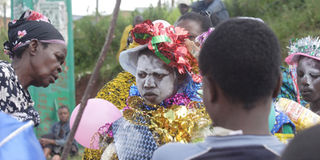Bedroom matters should be issues of national concern

A caregiver inspects girls who had just undergone circumcision. FILE PHOTO |
What you need to know:
I found the thinking of chama members quite unique and so chose to provide basic information to help them chart a viable political agenda.
There are a number of laws, policies, practices, cultures and traditions that not only compromise the sexual satisfaction of women, but also pose a serious risk to their health, thereby compromising the stability of families and economic development of communities, and which need to be taken to the highest level as a political priority.
At the core of this is sexual and gender based violence (SGBV).
Chama members have been thinking of joining politics. They are busy crafting their political agendas and some have become quite creative.
“Our agenda will be sexy,” the chairperson explained to me. “If we make sex a political agenda and ensure that it is enjoyed by each family, the nation will change. Functional families are the engines that drive development in any society and families cannot be stable if there are problems in the bedroom.”
Creative agenda
This is why chama members invited me to their meeting last weekend. I am the only male member and I am invited to their meetings only when sex issues are being discussed.
“So tell us your thoughts around our creative agenda,” the deputy chairperson said excitedly. “Our call to action will be to encourage voters to vote for intimacy in families as the first step in transforming the socio-economic fabric of the whole country because the peace of mind that is necessary for us to realise development is born of a happy, intimate and sexually-satisfied family.”
“I totally support your agenda, but do you actually understand what you are getting into?” I asked.
“Well, that is exactly why you are here – to help us interrogate the topic so that we understand what needs to be done for the country to realise this noble dream,” the chairperson explained.
I found the thinking of chama members quite unique and so chose to provide basic information to help them chart a viable political agenda.
There are a number of laws, policies, practices, cultures and traditions that not only compromise the sexual satisfaction of women, but also pose a serious risk to their health, thereby compromising the stability of families and economic development of communities, and which need to be taken to the highest level as a political priority.
At the core of this is sexual and gender based violence (SGBV).
In Kenya where 43 per cent of women aged 15 – 49 years have experienced some form of violence from their partners.
Major cause of ill health
SGBV is a major cause of ill health among women, characterised by death and disabilities due to injuries as well as an increased vulnerability to a range of physical and mental health problems. Survivors of sexual violence are more likely than other women to have unintended pregnancies, report symptoms of reproductive tract infections and have multiple partners.
They are less likely to use condoms and other contraceptives. Violence and the fear of violence severely limit women’s contribution to social and economic development.
“This should definitely be an agenda for us,” said a member. “Despite its prevalence and seriousness, SGBV is not a political agenda for any party today. We must come out strongly and demand protection for all women!”
Women also need to fight Female genital mutilation (FGM) which continues to be practiced in various parts of the world. One worrying trend in Africa is the dramatic increase in the proportion of FGM operations carried out by trained health-care personnel. Today, many Kenyan communities that do FGM arrange for their daughters to undergo it in health facilities.
Another worrying problem is widow inheritance. In communities where it is performed, sex rituals are part of the practice and are known to expose women to HIV infection and other STDs, as well as unwanted pregnancies.
The practice is perpetuated by stigmatising and isolating the widow, denying her right to property and curtailing her rights of association.
Forced sex and physical violence are prevalent where women resist inheritance. Widowed women are stopped by communities from participating effectively in development.
On a more medical side, obstetric fistula remains a big problem. It is a birth complication that leads to uncontrollable leakage of urine and/or stool through the birth canal.
Women who experience obstetric fistula suffer constant incontinence, shame, social segregation and persistent reproductive health problems. There are many women living in poverty and isolation in Kenya today because of this problem.
“Members, our agenda is well set, we are going for political positions to liberate our mothers, sisters and daughters from sex-related vices.
There is no turning back,” said the chairperson as the members chanted.





